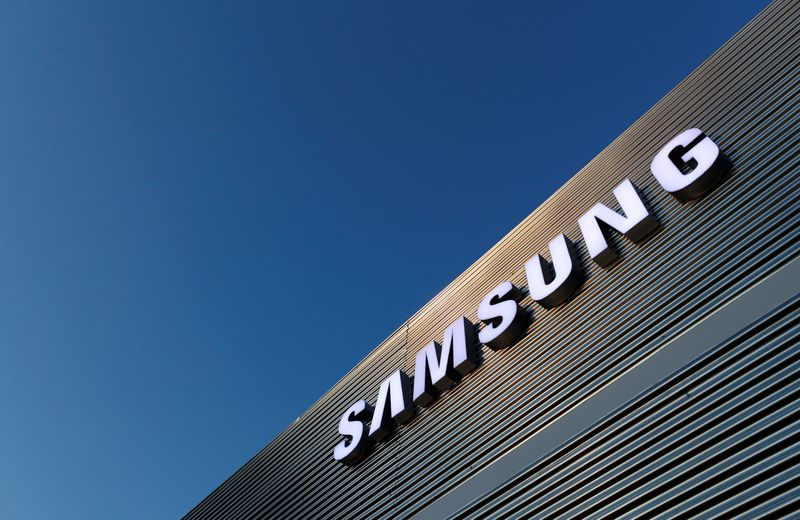By Heekyong Yang and Fanny Potkin
SEOUL/SINGAPORE (Reuters) -Samsung Electronics' latest high bandwidth memory (HBM) chips have yet to pass Nvidia (NASDAQ:NVDA)'s tests for use in the U.S. firm's AI processors due to heat and power consumption problems, three people briefed on the issues said.
The problems affect Samsung (KS:005930)'s HBM3 chips, which are the fourth-generation HBM standard currently most used in graphics processing units (GPUs) for artificial intelligence, as well as fifth-generation HBM3E chips that the South Korean tech giant and its rivals are bringing to market this year, they said.
The reasons for Samsung failing Nvidia's tests are being reported for the first time.
Samsung said in a statement to Reuters that HBM is a customized memory product requiring "optimization processes in tandem with customers' needs," adding that it is in the process of optimizing its products through close collaboration with customers. It declined to comment on specific customers.
In separate statements after Reuters first published this report, Samsung said that "claims of failing due to heat and power consumption are not true," and that testing was "proceeding smoothly and as planned."
Nvidia declined to comment.
HBM - a type of dynamic random access memory or DRAM standard first produced in 2013 in which chips are vertically stacked to save space and reduce power consumption - helps process massive amounts of data produced by complex AI applications. As demand for sophisticated GPUs has soared amid the generative AI boom, so has demand for HBM.
Satisfying Nvidia - which commands around 80% of the global GPU market for AI applications - is seen as key to future growth for HBM manufacturers - both reputationally and in terms of profit momentum.
Samsung has been trying to pass Nvidia's tests for HBM3 and HBM3E since last year, the three sources said. According to two of the people, the results of a recent failed test for Samsung's 8-layer and 12-layer HBM3E chips came in April.
It was not immediately clear if the problems can be easily addressed, but the three sources said that the failures to meet Nvidia's requirements have increased concerns in the industry and among investors that Samsung could fall further behind rivals SK Hynix and Micron Technology (NASDAQ:MU) in HBM.
The sources, two of whom were briefed on the matter by Samsung officials, spoke on condition of anonymity as the information was confidential.
Samsung's shares fell 2% in early Friday trade, slightly weaker than the broader market.
NEW CHIP UNIT HEAD
In contrast to Samsung, domestic rival SK Hynix is the main supplier of HBM chips to Nvidia and has been supplying HBM3 since June 2022. It also began supplying HBM3E in late March to a customer it declined to identify. Shipments went to Nvidia, sources have said.
Micron, the only other major manufacturer of HBM, has also said it will supply Nvidia with HBM3E.
In a move that analysts said appeared to underscore Samsung's concerns about its laggard position in HBM, Samsung this week replaced the head of its semiconductor unit saying a new person at the top was needed to navigate what it called a "crisis" affecting the industry.
Market expectations have been high that Samsung, as the world's biggest maker of memory chips, would quickly pass Nvidia's tests, but it's also natural that specialised products like HBM will take some time to meet customers' performance evaluations, said Jeff Kim, head of research at KB Securities.
Although Samsung has yet to become a supplier of HBM3 to Nvidia, it does supply customers such as Advanced Micro Devices (NASDAQ:AMD) and is aiming to begin mass production of HBM3E chips in the second quarter. Samsung said in its statement to Reuters that its product schedule is proceeding as planned.
Analysts also say that SK Hynix, which developed the first HBM chip in 2013, has spent far more time and resources on HBM research and development than Samsung over the past decade, accounting for its technological edge.
Samsung said in its statement that it developed the first commercial HBM solution for high-performance computing in 2015 and has continued to invest in HBM since then.
GPU manufacturers like Nvidia and AMD are keen for Samsung to perfect its HBM chips so they can have more vendor options and weaken SK Hynix's pricing power, the sources also said.
At an Nvidia AI conference in March, Nvidia CEO Jensen Huang signed a placard at Samsung's booth that said "Jensen approved" for Samsung's 12-layer HBM3E - underscoring the company's enthusiasm about the prospect of Samsung supplying those chips.
HBM3E chips are likely to become the mainstream HBM product in the market this year with shipments concentrated in the second half of 2024, according to research firm Trendforce.
Separately, SK Hynix estimates that demand for HBM memory chips in general could increase at an annual rate of 82% through 2027.

Analysts have said that Samsung's relatively weak position in HBM has been noticed by investors. Its shares are down 2% for the year to date, while SK Hynix's stock is up 42% and Micron's shares are up 48%.
($1 = 1,362.8600 won)